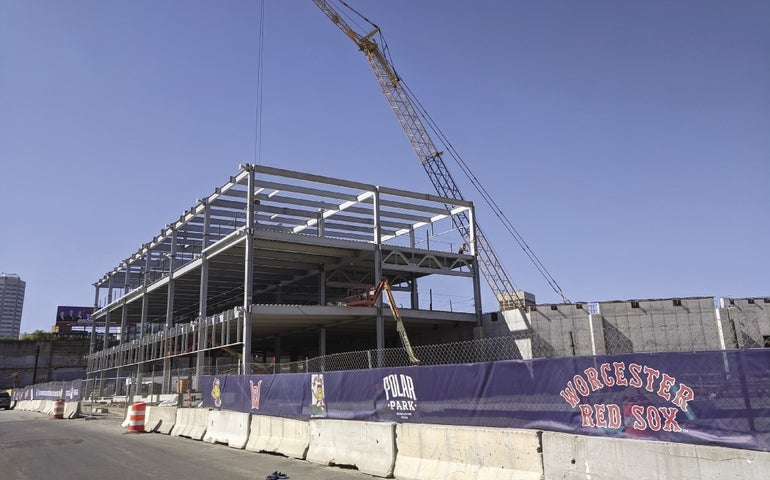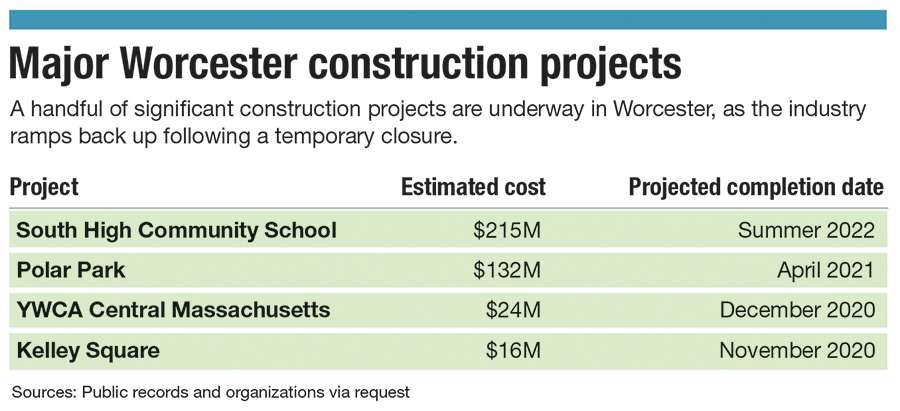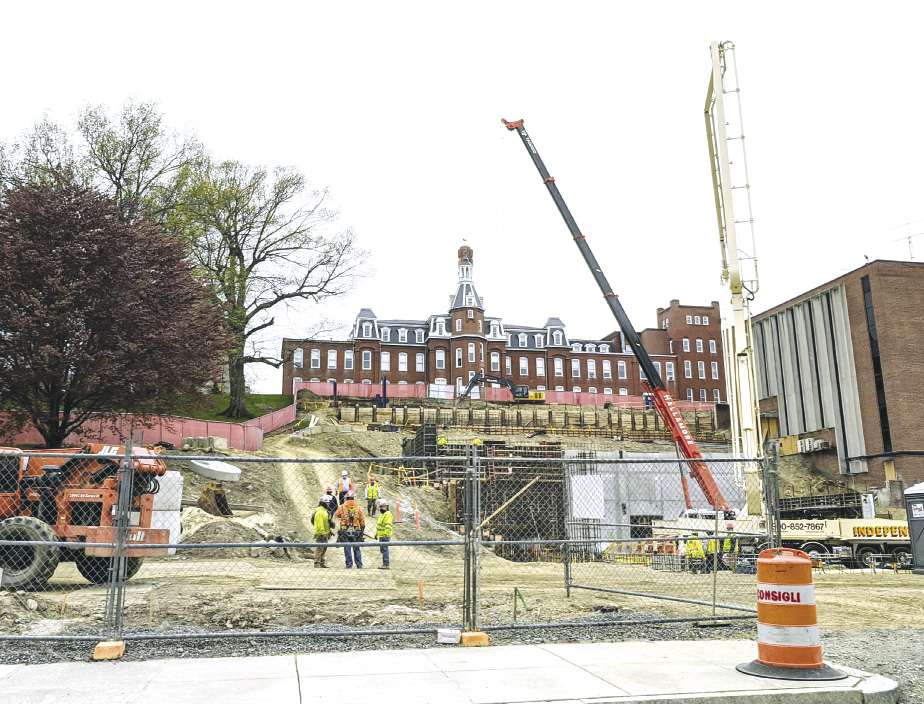
Construction projects adjust to new rules as deadlines loom
 PHOTO/GRANT WELKER
Construction has resumed at the $132-million Polar Park baseball stadium.
PHOTO/GRANT WELKER
Construction has resumed at the $132-million Polar Park baseball stadium.
With the economy turned on its head, at least one industry appears to be faring the uncertainty relatively well, all things considered: construction.
One of the first sectors officially allowed to resume nonessential private operations under Gov. Charlie Baker’s reopening plan, worksites around Central Massachusetts were officially back up and running as of May 18. But as with virtually every other venture requiring leaving the house, crews are returning to a workplace with vastly different rules about how they work, how they socialize, and how they are expected to take care of themselves.

“People have been very understanding of all the restrictions, honestly,” said David Fontaine Jr., vice president of Fontaine Bros., Inc., which operates out of Worcester and Springfield. The company is handling, among other things, the $215-million South High Community School project in Worcester.
In compliance with social distancing regulations, Fontaine said the company’s crew members are no longer allowed to take breaks or have their lunches together, outside vendors are not permitted on the premises, and site leadership has explored staggering work to limit employees from being in close proximity to each other on the job.
Although construction is typically a fraternal industry, Fontaine said workers appeared to be more concerned about communication from management than they were about being allowed to gather amongst themselves.
“The biggest thing for us in terms of concern for morale is actually making sure that we’re being very communicative with everybody,” Fontaine said.

New safety standards
While certain social distancing and sanitization procedures implemented in response to coronavirus pandemic have become polarizing and politicized, Massachusetts Building Trades Council President Frank Callahan said most of the union members he works with are eager to comply with the new safety standards.
“They want to go to work, but they also want to go to work safely,” Callahan said, who said safety has always been MBTC’s No. 1 priority.
In many ways, those workers may not have any choice. Lengthy construction site workplace safety expectations detailed by Baker’s office provide guidance and regulations for everything from who may ride in vehicles (one person at a time) to alcohol consumption (discouraged) to self-certified health reports at the start of every shift.

Site-specific COVID-19 officers must be designated for every site except for construction and remodeling in family homes where five or less workers are on-hand at any time. According to the state guidance, a contractor may designate one officer to review all small sites in a city or town. The COVID-19 safety officers are required to compile and maintain daily written reports certifying the contractor and all subcontractors are in full compliance with all coronavirus-related regulations.
Cities and towns may require large, complex project owners to submit a site-specific risk analysis and enhanced coronavirus safety plan. The same local authorities may order work to temporarily pause on those sites until they review and approve the submitted plan.
The MBTC has worked with its affiliated contractors to help promote COVID-19 safety standard compliance, according to Callahan, who said the council speaks with employers on a near-daily basis, something setting it apart from other trade groups. Representatives from the MBTC have gone out to physically inspect job sites, he said.
That said, Callahan contended non-compliance with coronavirus safety regulations was significantly higher among non-union crews, especially earlier on in the crisis.
Notably, the MBTC called for a complete non-essential construction shutdown statewide on March 31. Callahan argued in a statement at the time it was “impractical and, in many cases, impossible to safely work on a construction project given the current state of affairs.”
Together with industry stakeholders and public health experts, the MBTC worked to develop best practices and safety procedures for crew members, which are now available on the organization’s website.
Trying to get back on schedule
Although nonessential private construction sites were shuttered from March 31 to May 18, contractors interviewed for this story expressed optimism about their project timelines, contending they were on track to meet any deadlines.
“We just have to engineer the work better, put the guys around the site a little bit better,” said Justin Dias, spokesman for Worcester construction manager F.W. Madigan Co.
Logistically, Dias said the contracting company attempted to tackle any timeline or planning issues in the background, from the project management side of operations. To that end, he said customers and clients shouldn’t feel the impact of the industry shutdown.
Dias pointed out construction was going to have to resume eventually, even if nonessential projects were temporarily halted. There are projects to be built and plenty of crews eager to get back to work.
“Everyone’s handling it a lot better than we ever thought,” Dias said. “Everyone’s pretty receptive of all these new guidelines and protocols. I think we’re moving along pretty well, and I think we’re happy with how it turned out, all things considered.”








0 Comments